雅思大作文分类保护动物意义讲义
- 格式:doc
- 大小:21.50 KB
- 文档页数:1
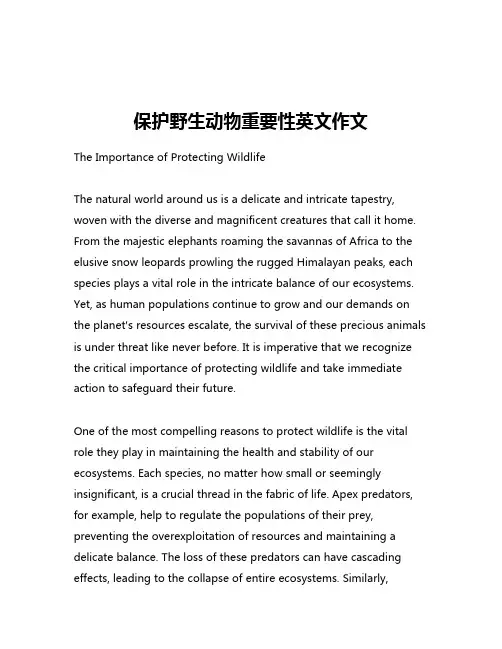
保护野生动物重要性英文作文The Importance of Protecting WildlifeThe natural world around us is a delicate and intricate tapestry, woven with the diverse and magnificent creatures that call it home. From the majestic elephants roaming the savannas of Africa to the elusive snow leopards prowling the rugged Himalayan peaks, each species plays a vital role in the intricate balance of our ecosystems. Yet, as human populations continue to grow and our demands on the planet's resources escalate, the survival of these precious animals is under threat like never before. It is imperative that we recognize the critical importance of protecting wildlife and take immediate action to safeguard their future.One of the most compelling reasons to protect wildlife is the vital role they play in maintaining the health and stability of our ecosystems. Each species, no matter how small or seemingly insignificant, is a crucial thread in the fabric of life. Apex predators, for example, help to regulate the populations of their prey, preventing the overexploitation of resources and maintaining a delicate balance. The loss of these predators can have cascading effects, leading to the collapse of entire ecosystems. Similarly,pollinators such as bees and butterflies are essential for the reproduction of many plant species, ensuring the continued growth and diversity of our forests, grasslands, and agricultural landscapes.Moreover, the preservation of wildlife is not just an environmental concern but also a matter of human well-being. Many indigenous communities around the world rely on the sustainable use of natural resources, including the harvesting of wild animals, for their livelihoods and cultural traditions. The loss of these species can devastate these communities, depriving them of their primary sources of food, medicine, and income. Additionally, the decline of wildlife can have far-reaching consequences for human health, as many of the medicines we rely on are derived from natural sources.Beyond the practical and utilitarian reasons for protecting wildlife, there is also a profound moral and ethical imperative. These magnificent creatures are sentient beings, capable of experiencing pain, fear, and joy. They have an inherent right to exist, to thrive, and to fulfill their role in the natural world. By safeguarding their habitats and ensuring their survival, we not only preserve the beauty and wonder of the natural world but also uphold our responsibility as stewards of the planet.Unfortunately, the threats facing wildlife are numerous and growing. Habitat loss, due to factors such as deforestation, urbanization, andagricultural expansion, is one of the primary drivers of species decline. As human activities encroach on natural landscapes, the delicate balance of ecosystems is disrupted, forcing wildlife to compete for dwindling resources or to adapt to rapidly changing environments. Climate change, too, poses a grave threat, as rising temperatures, shifting weather patterns, and the increasing frequency of extreme weather events can devastate fragile ecosystems and disrupt the life cycles of countless species.Poaching and the illegal wildlife trade are also major contributors to the decline of many species. The demand for exotic pets, traditional medicine ingredients, and luxury goods made from animal parts has fueled a thriving black market, leading to the ruthless slaughter of elephants, rhinos, tigers, and countless other vulnerable creatures. This illicit trade not only decimates populations but also funds organized crime and undermines conservation efforts.In the face of these daunting challenges, it is clear that the protection of wildlife requires a multifaceted and collaborative approach. Governments, conservation organizations, and individual citizens must work together to implement robust policies, strengthen law enforcement, and raise awareness about the importance of preserving our natural heritage. This may involve the creation of protected areas, the enforcement of anti-poaching measures, and the promotion of sustainable tourism and ecologically responsiblepractices.At the same time, we must also address the underlying drivers of wildlife decline, such as unsustainable development and the overconsumption of natural resources. This will require a fundamental shift in our relationship with the natural world, moving away from a mindset of exploitation and toward one of stewardship and respect. By embracing more sustainable practices, supporting local communities, and fostering a deeper appreciation for the intrinsic value of wildlife, we can work to reverse the tide of species loss and ensure a future where our children and grandchildren can marvel at the incredible diversity of life that graces our planet.The protection of wildlife is not just a lofty ideal but a moral imperative and a practical necessity for the well-being of our planet and all its inhabitants. By recognizing the vital role that these creatures play in the delicate balance of our ecosystems, and by taking decisive action to safeguard their future, we can ensure that the natural world continues to thrive and inspire generations to come. It is our responsibility as the dominant species on this planet to be the stewards of its remarkable diversity, and to ensure that the wondrous tapestry of life remains vibrant and resilient for centuries to come.。
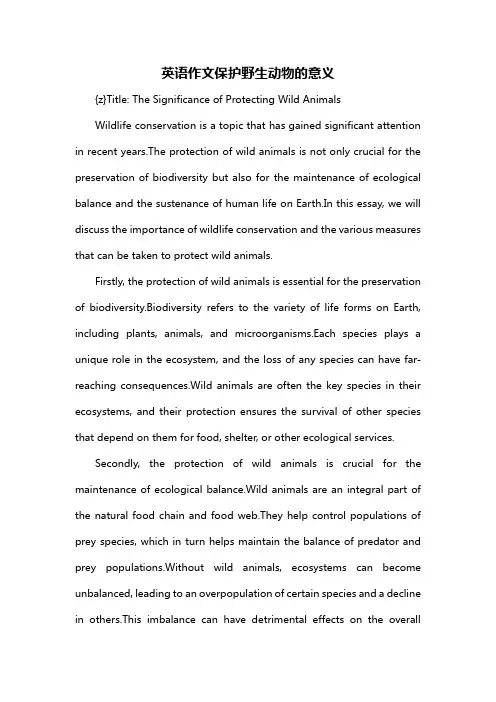
英语作文保护野生动物的意义{z}Title: The Significance of Protecting Wild AnimalsWildlife conservation is a topic that has gained significant attention in recent years.The protection of wild animals is not only crucial for the preservation of biodiversity but also for the maintenance of ecological balance and the sustenance of human life on Earth.In this essay, we will discuss the importance of wildlife conservation and the various measures that can be taken to protect wild animals.Firstly, the protection of wild animals is essential for the preservation of biodiversity.Biodiversity refers to the variety of life forms on Earth, including plants, animals, and microorganisms.Each species plays a unique role in the ecosystem, and the loss of any species can have far-reaching consequences.Wild animals are often the key species in their ecosystems, and their protection ensures the survival of other species that depend on them for food, shelter, or other ecological services.Secondly, the protection of wild animals is crucial for the maintenance of ecological balance.Wild animals are an integral part of the natural food chain and food web.They help control populations of prey species, which in turn helps maintain the balance of predator and prey populations.Without wild animals, ecosystems can become unbalanced, leading to an overpopulation of certain species and a decline in others.This imbalance can have detrimental effects on the overallhealth and stability of ecosystems.Furthermore, the protection of wild animals is essential for the sustenance of human life on Earth.Many of the resources that humans rely on for food, medicine, and other essential needs come from the natural environment.Wild animals contribute to the productivity and resilience of ecosystems, which provide these resources.Moreover, wild animals also play a crucial role in maintaining soil fertility, water cycles, and climate regulation.The loss of wild animals can have severe implications for human well-being and the ability of the planet to support life.To protect wild animals, various measures can be taken.One of the most effective ways to protect wildlife is to establish protected areas, such as national parks and nature reserves.These areas provide a safe haven for wild animals, free from human activities that threaten their survival.Additionally, strict regulations and laws should be implemented to prohibit activities such as poaching, illegal logging, and habitat destruction.These measures can help ensure the long-term survival of wild animal populations.Another crucial measure for wildlife conservation is the reforestation and restoration of degraded habitats.Trees and other vegetation provide essential habitats and food sources for many wild animal species.By planting trees and restoring degraded habitats, we can help createsuitable conditions for wild animals to thrive.Furthermore, public awareness and education are vital in the protection of wild animals.Many people are not aware of the importance of wildlife conservation or the threats that wild animals face.By raising awareness and educating the public about the significance of protecting wild animals, we can foster a sense of responsibility and encourage individuals to take action to conserve wildlife.In conclusion, the protection of wild animals is crucial for the preservation of biodiversity, the maintenance of ecological balance, and the sustenance of human life on Earth.By establishing protected areas, implementing strict regulations, restoring habitats, and raising public awareness, we can help ensure the long-term survival of wild animal populations.It is our responsibility to protect and preserve the beauty and importance of wildlife for future generations.。
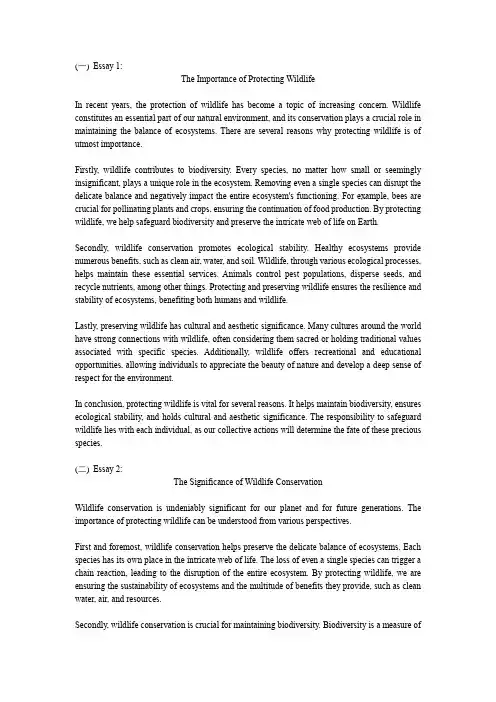
(一)Essay 1:The Importance of Protecting WildlifeIn recent years, the protection of wildlife has become a topic of increasing concern. Wildlife constitutes an essential part of our natural environment, and its conservation plays a crucial role in maintaining the balance of ecosystems. There are several reasons why protecting wildlife is of utmost importance.Firstly, wildlife contributes to biodiversity. Every species, no matter how small or seemingly insignificant, plays a unique role in the ecosystem. Removing even a single species can disrupt the delicate balance and negatively impact the entire ecosystem's functioning. For example, bees are crucial for pollinating plants and crops, ensuring the continuation of food production. By protecting wildlife, we help safeguard biodiversity and preserve the intricate web of life on Earth.Secondly, wildlife conservation promotes ecological stability. Healthy ecosystems provide numerous benefits, such as clean air, water, and soil. Wildlife, through various ecological processes, helps maintain these essential services. Animals control pest populations, disperse seeds, and recycle nutrients, among other things. Protecting and preserving wildlife ensures the resilience and stability of ecosystems, benefiting both humans and wildlife.Lastly, preserving wildlife has cultural and aesthetic significance. Many cultures around the world have strong connections with wildlife, often considering them sacred or holding traditional values associated with specific species. Additionally, wildlife offers recreational and educational opportunities, allowing individuals to appreciate the beauty of nature and develop a deep sense of respect for the environment.In conclusion, protecting wildlife is vital for several reasons. It helps maintain biodiversity, ensures ecological stability, and holds cultural and aesthetic significance. The responsibility to safeguard wildlife lies with each individual, as our collective actions will determine the fate of these precious species.(二)Essay 2:The Significance of Wildlife ConservationWildlife conservation is undeniably significant for our planet and for future generations. The importance of protecting wildlife can be understood from various perspectives.First and foremost, wildlife conservation helps preserve the delicate balance of ecosystems. Each species has its own place in the intricate web of life. The loss of even a single species can trigger a chain reaction, leading to the disruption of the entire ecosystem. By protecting wildlife, we are ensuring the sustainability of ecosystems and the multitude of benefits they provide, such as clean water, air, and resources.Secondly, wildlife conservation is crucial for maintaining biodiversity. Biodiversity is a measure ofthe variety of species present in an ecosystem. High biodiversity ensures the existence of robust and resilient ecosystems, capable of withstanding environmental changes. Preserving wildlife helps secure the genetic diversity and overall health of ecosystems, allowing them to adapt and survive in the face of global challenges like climate change.Moreover, wildlife conservation has economic value. Wildlife offers numerous economic benefits, including tourism, recreation, and research opportunities. Many regions rely on the presence of diverse and healthy wildlife populations to sustain their local economies. For instance, national parks and wildlife sanctuaries attract tourists, creating job opportunities and economic growth for local communities.In conclusion, wildlife conservation is of utmost importance due to its role in maintaining ecosystem balance, preserving biodiversity, and providing economic benefits. It is our responsibility as stewards of the planet to protect and conserve wildlife for the present and future generations.(三)Essay 3:The Role of Wildlife Protection in Environmental SustainabilityThe protection of wildlife plays a crucial role in achieving environmental sustainability. Here, we explore three key reasons why wildlife conservation is essential for a sustainable future.Firstly, wildlife conservation is directly linked to the preservation of biodiversity. Biodiversity is the variety of life on Earth, from the smallest microorganisms to the largest mammals. It is a fundamental aspect of thriving ecosystems and provides numerous ecological services, such as pollination, nutrient cycling, and disease control. By protecting wildlife and their habitats, we safeguard biodiversity and maintain the delicate balance necessary for sustainable ecosystems.Secondly, wildlife conservation is essential for sustainable resource management. Many wildlife species are directly linked to ecosystem services that are vital for human survival. For example, forests, home to a vast array of wildlife species, act as carbon sinks, mitigating climate change. Marine ecosystems, hosting diverse marine life, support sustainable fishing practices, providing food security for millions of people. By protecting wildlife, we ensure the long-term sustainability of these vital resources.Furthermore, wildlife conservation contributes to environmental education and awareness. By conserving wildlife, we provide opportunities for research and education, raising awareness about the interconnectedness of all living beings and the impact of human activities on the environment. This knowledge fosters a sense of responsibility and empowers individuals and communities to make informed decisions that support sustainable practices.In conclusion, wildlife conservation is integral to environmental sustainability. It protects biodiversity, enables sustainable resource management, and fosters environmental education. By recognizing the importance of wildlife protection and taking collective action, we can create a sustainable future for ourselves and future generations.。
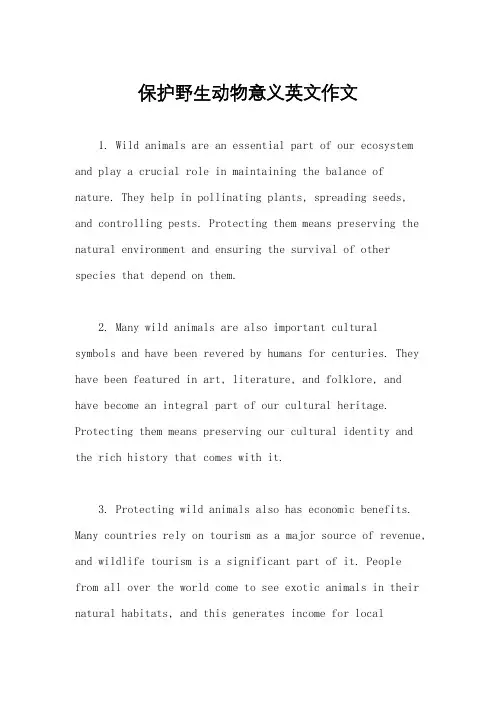
保护野生动物意义英文作文1. Wild animals are an essential part of our ecosystem and play a crucial role in maintaining the balance of nature. They help in pollinating plants, spreading seeds, and controlling pests. Protecting them means preserving the natural environment and ensuring the survival of other species that depend on them.2. Many wild animals are also important cultural symbols and have been revered by humans for centuries. They have been featured in art, literature, and folklore, and have become an integral part of our cultural heritage. Protecting them means preserving our cultural identity and the rich history that comes with it.3. Protecting wild animals also has economic benefits. Many countries rely on tourism as a major source of revenue, and wildlife tourism is a significant part of it. People from all over the world come to see exotic animals in their natural habitats, and this generates income for localcommunities. Protecting them means preserving the tourism industry and the livelihoods of those who depend on it.4. The loss of wild animals can also have serious consequences for human health. Many animals are natural hosts for diseases that can be transmitted to humans. The disappearance of these animals can lead to an increase in disease outbreaks and epidemics. Protecting them means safeguarding public health and preventing the spread of zoonotic diseases.5. Finally, protecting wild animals is simply the right thing to do. They have an intrinsic value and a right to exist in their natural habitats without fear of persecution or extinction. As humans, we have a responsibility to protect and preserve the natural world for future generations to enjoy. Protecting them means fulfilling our moral obligation to the planet and its inhabitants.。
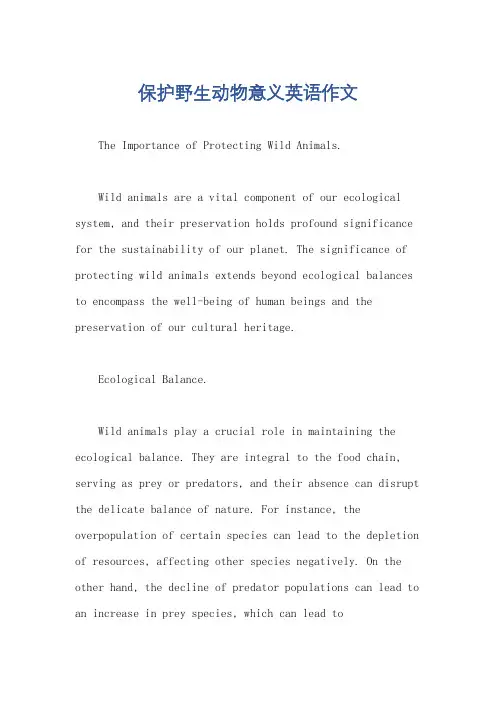
保护野生动物意义英语作文The Importance of Protecting Wild Animals.Wild animals are a vital component of our ecological system, and their preservation holds profound significance for the sustainability of our planet. The significance of protecting wild animals extends beyond ecological balances to encompass the well-being of human beings and the preservation of our cultural heritage.Ecological Balance.Wild animals play a crucial role in maintaining the ecological balance. They are integral to the food chain, serving as prey or predators, and their absence can disrupt the delicate balance of nature. For instance, the overpopulation of certain species can lead to the depletion of resources, affecting other species negatively. On the other hand, the decline of predator populations can lead to an increase in prey species, which can lead tooverpopulation and eventually resource depletion. By protecting wild animals, we ensure the healthy functioningof the ecosystem and maintain a balance that supports life.Biodiversity.Wild animals contribute to biodiversity, which iscrucial for the resilience and adaptability of our planet. Biodiversity refers to the variety of species, genes, and ecosystems found in a particular region. It is thisdiversity that allows ecosystems to adapt to changing environmental conditions and recover from natural disasters. By protecting wild animals, we preserve this biodiversity and ensure that our planet remains vibrant and diverse.Human Well-being.Wild animals provide direct and indirect benefits to human beings. They are a source of food, medicine, andother resources that are essential for our survival. For instance, many traditional medicines are derived from wild animals, and some cultures rely on them for subsistence.Additionally, wild animals contribute to tourism and recreation, generating revenue and employment opportunities. By protecting wild animals, we ensure the continuedprovision of these benefits and contribute to the economic well-being of our communities.Cultural Heritage.Wild animals are often a part of our cultural heritage and play a significant role in our traditions and folklore. They are often symbols of strength, beauty, and wisdom in various cultures. By protecting wild animals, we preserve these cultural values and ensure that future generationscan appreciate and learn from them.Ethical Responsibility.As sentient beings, we have an ethical responsibilityto treat all life with respect and compassion. Wild animals, despite their differences from us, deserve to live freefrom harm and exploitation. By protecting wild animals, we fulfill this ethical responsibility and contribute to amore compassionate and just world.In conclusion, the protection of wild animals is crucial for the sustainability of our planet and the well-being of all life. It preserves ecological balances, maintains biodiversity, supports human well-being, preserves cultural heritage, and fulfills our ethical responsibilities. It is our duty to ensure that wild animals are protected and given the space they need to thrive. By doing so, we contribute to a healthier, more resilient, and compassionate world.。
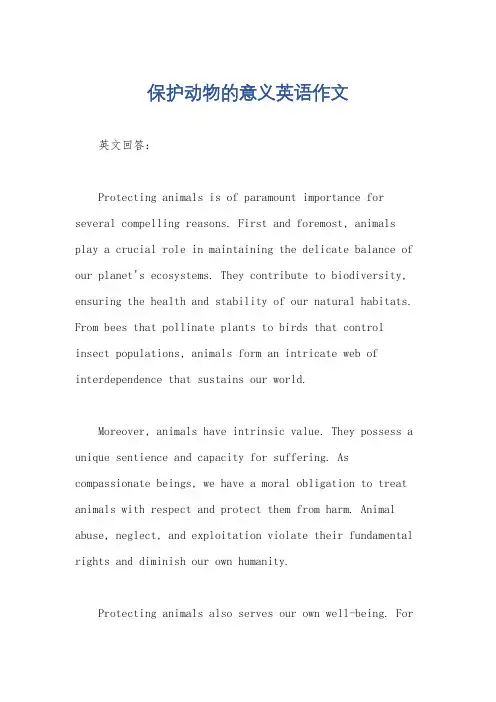
保护动物的意义英语作文英文回答:Protecting animals is of paramount importance for several compelling reasons. First and foremost, animals play a crucial role in maintaining the delicate balance of our planet's ecosystems. They contribute to biodiversity, ensuring the health and stability of our natural habitats. From bees that pollinate plants to birds that control insect populations, animals form an intricate web of interdependence that sustains our world.Moreover, animals have intrinsic value. They possess a unique sentience and capacity for suffering. As compassionate beings, we have a moral obligation to treat animals with respect and protect them from harm. Animal abuse, neglect, and exploitation violate their fundamental rights and diminish our own humanity.Protecting animals also serves our own well-being. Forinstance, companion animals provide companionship, reduce stress, and improve our physical and mental health. Livestock animals supply us with essential food and materials. Additionally, animals contribute to the economy through tourism, research, and entertainment.Furthermore, protecting animals is essential for future generations. If we fail to conserve animal species and habitats, our children and grandchildren will inherit a diminished and depleted world. It is our collective responsibility to ensure that future generations have the opportunity to experience the wonder and beauty of the natural world, including its diverse array of animal life.中文回答:保护动物具有至关重要的意义,原因有多方面。
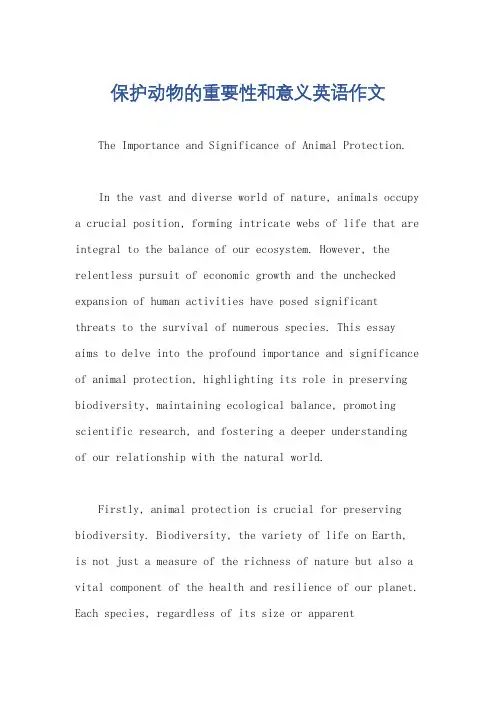
保护动物的重要性和意义英语作文The Importance and Significance of Animal Protection.In the vast and diverse world of nature, animals occupy a crucial position, forming intricate webs of life that are integral to the balance of our ecosystem. However, the relentless pursuit of economic growth and the unchecked expansion of human activities have posed significant threats to the survival of numerous species. This essay aims to delve into the profound importance and significance of animal protection, highlighting its role in preserving biodiversity, maintaining ecological balance, promoting scientific research, and fostering a deeper understanding of our relationship with the natural world.Firstly, animal protection is crucial for preserving biodiversity. Biodiversity, the variety of life on Earth,is not just a measure of the richness of nature but also a vital component of the health and resilience of our planet. Each species, regardless of its size or apparentsignificance, plays a unique role in its ecosystem. The loss of even a single species can trigger a cascade of effects, disrupting the delicate balance that has evolved over millions of years. By protecting animals, we are safeguarding the rich tapestry of life that makes our world so vibrant and dynamic.Moreover, animal protection is essential for maintaining ecological balance. Ecosystems are complex networks of interactions, where each species depends on the others for survival. Predators, for instance, help to control the population of their prey, preventing overpopulation and the subsequent.。
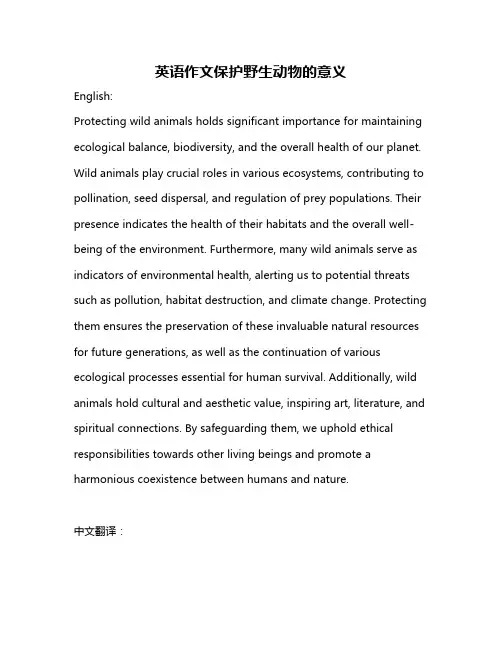
英语作文保护野生动物的意义English:Protecting wild animals holds significant importance for maintaining ecological balance, biodiversity, and the overall health of our planet. Wild animals play crucial roles in various ecosystems, contributing to pollination, seed dispersal, and regulation of prey populations. Their presence indicates the health of their habitats and the overall well-being of the environment. Furthermore, many wild animals serve as indicators of environmental health, alerting us to potential threats such as pollution, habitat destruction, and climate change. Protecting them ensures the preservation of these invaluable natural resources for future generations, as well as the continuation of various ecological processes essential for human survival. Additionally, wild animals hold cultural and aesthetic value, inspiring art, literature, and spiritual connections. By safeguarding them, we uphold ethical responsibilities towards other living beings and promote a harmonious coexistence between humans and nature.中文翻译:保护野生动物对于维护生态平衡、生物多样性以及整个地球的健康具有重要意义。
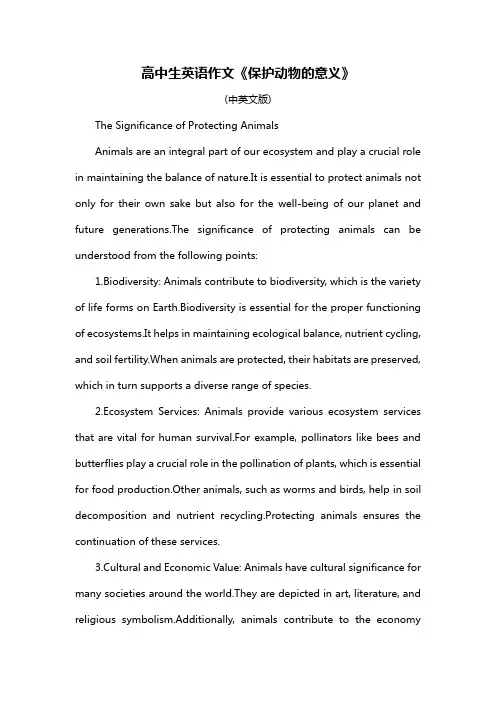
高中生英语作文《保护动物的意义》(中英文版)The Significance of Protecting AnimalsAnimals are an integral part of our ecosystem and play a crucial role in maintaining the balance of nature.It is essential to protect animals not only for their own sake but also for the well-being of our planet and future generations.The significance of protecting animals can be understood from the following points:1.Biodiversity: Animals contribute to biodiversity, which is the variety of life forms on Earth.Biodiversity is essential for the proper functioning of ecosystems.It helps in maintaining ecological balance, nutrient cycling, and soil fertility.When animals are protected, their habitats are preserved, which in turn supports a diverse range of species.2.Ecosystem Services: Animals provide various ecosystem services that are vital for human survival.For example, pollinators like bees and butterflies play a crucial role in the pollination of plants, which is essential for food production.Other animals, such as worms and birds, help in soil decomposition and nutrient recycling.Protecting animals ensures the continuation of these services.3.Cultural and Economic Value: Animals have cultural significance for many societies around the world.They are depicted in art, literature, and religious symbolism.Additionally, animals contribute to the economythrough tourism, wildlife conservation, and the pharmaceutical industry.Protecting animals ensures the preservation of cultural heritage and economic benefits.cational Value: Animals serve as a source of inspiration for scientists, researchers, and educators.They provide valuable insights into biology, ecology, and conservation.By protecting animals, we ensure that future generations have the opportunity to learn and explore the wonders of the natural world.5.Ethical Responsibility: As humans, we have a moral obligation to protect animals.Animals have feelings, emotions, and the right to live their lives.Torturing or harming animals is unethical and goes against the principles of humanity.Protecting animals is a reflection of our empathy and compassion towards other living beings.In conclusion, protecting animals is of utmost importance for the preservation of biodiversity, provision of ecosystem services, cultural and economic value, educational benefits, and ethical reasons.It is our responsibility to ensure the survival of these magnificent creatures and create a sustainable future for both humans and animals.。
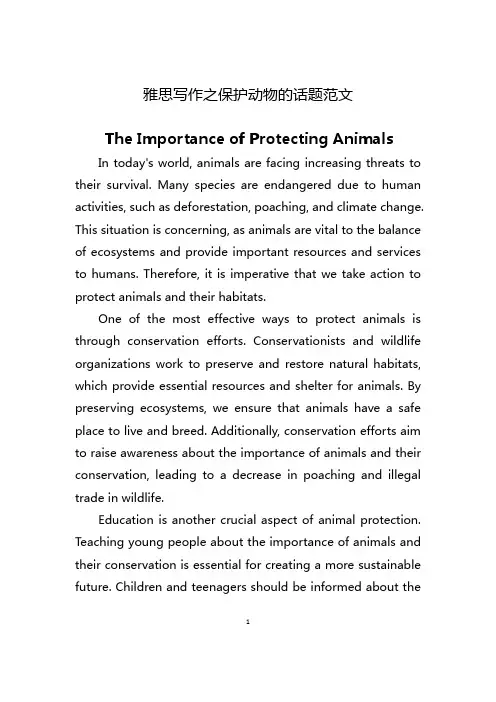
雅思写作之保护动物的话题范文The Importance of Protecting AnimalsIn today's world, animals are facing increasing threats to their survival. Many species are endangered due to human activities, such as deforestation, poaching, and climate change. This situation is concerning, as animals are vital to the balance of ecosystems and provide important resources and services to humans. Therefore, it is imperative that we take action to protect animals and their habitats.One of the most effective ways to protect animals is through conservation efforts. Conservationists and wildlife organizations work to preserve and restore natural habitats, which provide essential resources and shelter for animals. By preserving ecosystems, we ensure that animals have a safe place to live and breed. Additionally, conservation efforts aim to raise awareness about the importance of animals and their conservation, leading to a decrease in poaching and illegal trade in wildlife.Education is another crucial aspect of animal protection. Teaching young people about the importance of animals and their conservation is essential for creating a more sustainable future. Children and teenagers should be informed about the1impact of human activities on animal populations and the negative consequences of exploiting natural resources. By fostering a sense of responsibility and empathy towards animals in young minds, we can create a generation that cares about and takes action to protect animals.Moreover, legislative measures play a vital role in animal protection. Governments should enact laws and regulations that prohibit hunting, poaching, and illegal trade in wildlife. Penalties should be severe for those who violate these laws, serving as a deterrent to prevent future illegal activities. Additionally, laws should provide protections for animal habitats, ensuring that their destruction is prevented or minimized.In conclusion, protecting animals is crucial for maintaining the balance of ecosystems and ensuring the survival of species. We must take action to conserve their habitats, raise awareness through education, and enact strong legislative measures to prohibit exploitation and illegal trade in wildlife. By doing so, we can create a more sustainable world where animals and humans coexist harmoniously.2。
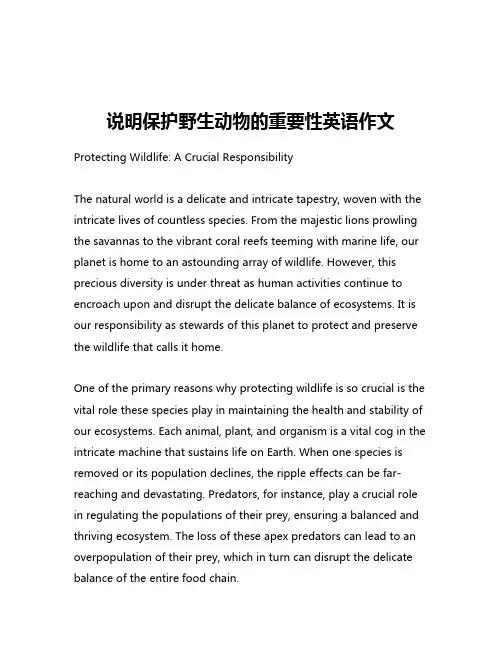
说明保护野生动物的重要性英语作文Protecting Wildlife: A Crucial ResponsibilityThe natural world is a delicate and intricate tapestry, woven with the intricate lives of countless species. From the majestic lions prowling the savannas to the vibrant coral reefs teeming with marine life, our planet is home to an astounding array of wildlife. However, this precious diversity is under threat as human activities continue to encroach upon and disrupt the delicate balance of ecosystems. It is our responsibility as stewards of this planet to protect and preserve the wildlife that calls it home.One of the primary reasons why protecting wildlife is so crucial is the vital role these species play in maintaining the health and stability of our ecosystems. Each animal, plant, and organism is a vital cog in the intricate machine that sustains life on Earth. When one species is removed or its population declines, the ripple effects can be far-reaching and devastating. Predators, for instance, play a crucial role in regulating the populations of their prey, ensuring a balanced and thriving ecosystem. The loss of these apex predators can lead to an overpopulation of their prey, which in turn can disrupt the delicate balance of the entire food chain.Furthermore, many wildlife species are essential to the pollination of plants and the dispersal of seeds, processes that are vital for the continued growth and regeneration of our forests, grasslands, and other natural habitats. The decline or disappearance of these species can have far-reaching consequences, leading to a decrease in biodiversity and the potential collapse of entire ecosystems.In addition to the ecological importance of wildlife, these creatures hold immense intrinsic value. Each species, from the majestic elephant to the humble honeybee, is a unique and irreplaceable part of the tapestry of life on our planet. Their existence enriches our world, inspiring wonder, awe, and a deep appreciation for the natural world. The loss of any species is not only a tragedy for the ecosystem but also a loss of the inherent beauty and diversity that makes our planet so remarkable.Moreover, the protection of wildlife is closely tied to the well-being of human communities. Many indigenous and local populations rely on the sustainable use of natural resources, including wildlife, for their livelihoods and cultural traditions. The loss of these species can have devastating impacts on these communities, both economically and culturally. Furthermore, the preservation of wildlife habitats is crucial for maintaining the health and resilience of our own communities, as these natural areas provide essential ecosystemservices such as water filtration, flood control, and climate regulation.Despite the clear importance of wildlife conservation, the threats facing many species continue to escalate. Habitat loss, poaching, pollution, and climate change are just a few of the numerous challenges that wildlife populations are confronting. It is our responsibility as global citizens to take action and implement effective conservation strategies to protect these precious resources.One of the most crucial steps we can take is to support and strengthen policies and regulations that safeguard wildlife and their habitats. This includes advocating for the creation and enforcement of protected areas, the implementation of strict anti-poaching measures, and the development of sustainable land-use practices. Additionally, we must work to raise awareness and educate the public about the importance of wildlife conservation, inspiring individuals to make eco-friendly choices in their daily lives and to support conservation efforts.Another vital aspect of wildlife protection is the promotion of scientific research and the incorporation of traditional ecological knowledge. By deepening our understanding of the complex relationships within ecosystems and the unique needs of different species, we can develop more effective conservation strategies and better mitigate the threats facing wildlife.Furthermore, we must recognize the interconnectedness of human and animal well-being. Initiatives that promote sustainable development, ecotourism, and the equitable sharing of the benefits derived from natural resources can help to ensure that the protection of wildlife aligns with the interests and livelihoods of local communities.In conclusion, the protection of wildlife is not only a moral imperative but a critical necessity for the health and resilience of our planet. By recognizing the intrinsic value of these species, understanding their ecological importance, and taking concrete actions to safeguard their habitats, we can ensure that the rich tapestry of life on Earth continues to thrive for generations to come. It is our collective responsibility as global citizens to rise to this challenge and become steadfast guardians of the natural world.。
保护动物的重要性和提出的建议英语作文The importance of protecting animalsAs we all know, animals play a crucial role in maintaining the balance of nature. They are an essential part of the ecosystem and have a direct impact on the environment and human life. Therefore, it is crucial for us to protect animals and ensure their survival for the well-being of our planet.There are several reasons why protecting animals is important. Firstly, animals are an integral part of the food chain and help regulate the population of other species. If certain animal populations were to decline or become extinct, it could have a domino effect on the entire ecosystem, leading to imbalances that could ultimately threaten human existence as well. Additionally, many animals contribute to the pollination of plants, which is essential for agriculture and food production. Without bees, for example, many crops would not be able to reproduce, leading to food shortages and a decline in biodiversity.Furthermore, animals have inherent value and deserve to live their lives free from harm and suffering. Many species are facing threats from human activities such as habitat destruction,pollution, hunting, and climate change. It is our responsibility as stewards of the planet to protect these animals and ensure they can thrive in their natural habitats.In order to protect animals, there are several measures that can be taken. One of the most important steps is to create and enforce laws and regulations that protect endangered species and their habitats. Governments and conservation organizations should work together to establish protected areas where animals can live undisturbed and populations can recover. In addition, public awareness and education are key to changing attitudes and behaviors towards animals. By raising awareness about the importance of protecting animals and the consequences of their decline, we can inspire people to take action and make a difference.Individuals can also make a difference by supporting organizations that work to protect animals, volunteering at wildlife sanctuaries, and making sustainable choices in their daily lives. By reducing our carbon footprint, supporting ethical and sustainable practices, and advocating for animal rights, we can all contribute to the protection of animals and the preservation of our planet.In conclusion, protecting animals is essential for the health of our planet and the well-being of all its inhabitants. By taking action to protect animals and their habitats, we can ensure a sustainable future for generations to come. It is up to all of us to prioritize the protection of animals and work together to create a more harmonious relationship with the natural world. Let us all do our part to protect and preserve the incredible diversity of life on Earth.。
野生动物保护活动的目的和意义英语作文The purpose and significance of wildlife conservation activitiesIntroductionWildlife conservation is essential for maintaining biodiversity and ensuring the survival of various species. With the ongoing threat of habitat loss, poaching, and climate change, it has become crucial to take action in protecting our wildlife. This essay will discuss the purpose and significance of wildlife conservation activities.Purpose of wildlife conservation activitiesThe primary purpose of wildlife conservation activities is to protect and preserve the natural habitats of wild animals. Many species are facing extinction due to factors such as deforestation, pollution, and human encroachment. By working to preserve their habitats, we can help ensure the survival of these species for future generations.Another purpose of wildlife conservation activities is to prevent the illegal hunting and poaching of endangered species. Many animals, such as rhinos, elephants, and tigers, are hunted for their horns, tusks, or skins, driving them to the brink ofextinction. By enforcing laws and regulations against poaching and illegal wildlife trade, we can help protect these vulnerable species.Furthermore, wildlife conservation activities aim to raise awareness about the importance of preserving our natural resources. Through education and outreach programs, we can educate the public about the value of biodiversity and the impact of human activities on the environment. By fostering a greater understanding of these issues, we can inspire people to take action in protecting wildlife.Significance of wildlife conservation activitiesWildlife conservation activities are significant for several reasons. Firstly, they help maintain the balance of ecosystems. Every species plays a unique role in its ecosystem, and the loss of even a single species can have far-reaching consequences. By protecting wildlife, we can ensure that ecosystems remain healthy and functioning properly.Secondly, wildlife conservation activities contribute to scientific research and understanding. By studying wild animals in their natural habitats, researchers can learn more about their behavior, biology, and ecology. This knowledge can help informconservation efforts and improve our understanding of the natural world.Additionally, wildlife conservation activities support the livelihoods of local communities. Many people rely on wildlife for food, medicine, and income, and the loss of biodiversity can have devastating effects on their well-being. By protecting wildlife and their habitats, we can help support the sustainable development of these communities.ConclusionIn conclusion, wildlife conservation activities serve a vital purpose in protecting our natural world. By preserving habitats, preventing poaching, and raising awareness, we can help ensure the survival of wild animals and maintain biodiversity. It is important for individuals, governments, and organizations to work together to support wildlife conservation efforts and safeguard our planet for future generations.。
保护动物重要性英文作文Title: The Importance of Protecting AnimalsIntroduction:The natural world is a tapestry woven with an intricate array of life forms, among which animals play an integral role. They are not merely inhabitants of forests, oceans, and skies; they are essential components of ecosystems that ensure the balance of nature. Protecting animals is therefore not just a moral obligation stemming from compassion, but a crucial necessity for maintaining the health and stability of our planet. This essay will explore the various reasons why safeguarding animal species is of paramount importance and the cascading effects their loss can have on Earth's biodiversity, human well-being, and future generations.Biodiversity and Ecosystem Health:At the heart of the argument for protecting animals is the concept of biodiversity. Each species, including the seemingly most insignificant, contributes to the richness of life on Earth. Biodiversity ensures that ecosystems function optimally by providing resilience against environmental changes, pests, and diseases. For instance, pollinators like bees and butterflies are responsible for the reproduction of many plant species, which in turn support entire food chains. If these animals were to disappear, it could lead to a collapse in plant populations, affecting everything from agriculture to the habitats of other wildlife.Moreover, animals serve as indicators of environmental health. Many species are sensitive to changes in their environment, such as pollution or climate disruption. Their decline can signal impending problems for other organisms, including humans. By monitoring the status of animal populations, we can gather valuable information about thestate of our ecosystems and take preventive or remedial actions.Economic Value:The economic value of animals cannot be overstated. They provide a range of services and goods that are vital to human societies. For example, animals are a source of food, fiber, and medicine. They also contribute to tourism through safari attractions, marine life observation, and other ecotourism activities. These industries generate income and employment opportunities for millions of people worldwide.Furthermore, livestock farming is a significant part of many economies, providing not only nutrition but also livelihoods for farmers and related industries. Losing key animal species could mean losing entire sectors that rely on them, leading to economic downturns and increased poverty.Cultural and Educational Significance:Animals are deeply intertwined with human culture, history, and education. They feature prominently in folklore, religion, art, and literature across different societies.They are symbols of strength, wisdom, beauty, and evendeities in some cultures. The loss of animal species would mean the erasure of a part of our collective heritage and identity.Additionally, animals play a critical role in scientific research and education. They are subjects of study in biology, ecology, and conservation, helping us understand complex biological processes and the mechanisms of evolution. Research on animals has led to breakthroughs in medicine,from the development of antibiotics to treatments for various diseases.Human Well-being:Animals also contribute significantly to human mental and physical well-being. Interacting with pets has been shown toreduce stress, anxiety, and loneliness. Wildlife and marine parks offer recreational spaces where people can connect with nature, find tranquility, and improve their physical health through outdoor activities. The beauty and diversity of animals inspire wonder and respect for the natural world, fostering a sense of responsibility towards the environment.Conservation Efforts and Challenges:Despite the recognized importance of protecting animals, numerous challenges threaten their survival. Habitat destruction, climate change, poaching, illegal trade, and the effects of human activities are pushing many species to the brink of extinction. It is imperative that we strengthen conservation efforts, implement sustainable practices, and raise public awareness about the value of animals. Governments, NGOs, and individuals all have roles to play in ensuring that protection measures are effective and that laws are enforced to prevent the exploitation of animals.Conclusion:In conclusion, the protection of animals is essential for maintaining biodiversity, preserving ecosystem services, supporting economies, enriching cultures, advancing science, and enhancing human well-being. It is a task that requires global cooperation, informed policy-making, and a shift towards sustainable living. As stewards of the Earth, we must recognize that the fate of animals is intertwined with our own and that safeguarding them is not only our responsibility but also our best interest. By taking decisive action now, we can ensure a future where the magnificent tapestry of life remains intact for generations to come.。
《保护野生动物的意义》高中英语作文The Significance of Protecting Wild AnimalsWildlife conservation has become a pressing issue in today's world.The protection of wild animals is not only crucial for maintaining ecological balance but also essential for the survival of our own species.In this essay, we will discuss the significance of protecting wild animals and the steps that can be taken to ensure their safety.Firstly, wild animals play a vital role in maintaining the balance of ecosystems.They are an integral part of the food chain and help in regulating populations of other species.For instance, predators like lions and tigers control the population of prey species, preventing overgrazing and maintaining biodiversity.Moreover, wild animals contribute to the functioning of ecosystems by pollinating plants, dispersing seeds, and controlling pests.The loss of these species can have severe consequences for the entire ecosystem, leading to imbalances and potentially affecting human life.Secondly, protecting wild animals is crucial for the preservation of genetic diversity.Each species has a unique genetic makeup, and the loss of a species means losing that genetic information forever.Genetic diversity is essential for the adaptation and evolution of species in the face of changing environmental conditions.It also has medical and agricultural significance, as it can provide potential solutions to diseasesand crop threats.Furthermore, wild animals have economic value.Many countries rely on wildlife tourism as a source of income.People travel from all over the world to witness the beauty and diversity of wildlife.This industry generates revenue and creates job opportunities for local communities.However, the illegal trade of wildlife, such as poaching and trafficking, poses a threat to this industry and the survival of many species.To protect wild animals, governments, organizations, and individuals must take collective action.Strengthening laws and regulations against poaching and illegal trafficking is crucial.Additionally, creating protected areas and wildlife reserves can provide a safe habitat for wild animals.Public awareness campaigns and education are also essential in changing attitudes towards wildlife conservation.Encouraging sustainable practices and promoting the importance of biodiversity can help in preserving wild animals for future generations.In conclusion, the protection of wild animals is of utmost importance.It ensures the maintenance of ecological balance, preserves genetic diversity, and has economic significance.Through collective efforts and the implementation of effective conservation strategies, we can ensure a future where wild animals continue to thrive in their natural habitats.。
英语作文保护动物提纲As human beings, we are the dominant species on this planet. With this dominance comes a great responsibility to care for and protect the other species that share our world. One of the most important ways we can do this is by protecting animals and their habitats. In this essay, we will explore the importance of protecting animals and the ways in which we can do so.First and foremost, it is essential to protect animals because they are an integral part of the ecosystem. Each species plays a unique role in maintaining the balance of the natural world. For example, predators help control the population of prey animals, while herbivores help disperse seeds and maintain plant populations. When a species becomes extinct, it can have far-reaching effects on the entire ecosystem. Therefore, protecting animals is not just about preserving individual species, but about maintaining the health and stability of the entire environment.Furthermore, many animals are also important to humans for various reasons. For example, bees are crucial for pollinating crops, while certain plants and animals provide us with important medical resources. Protecting animals is therefore not just about preserving the natural world, but also about ensuring our own well-being.In addition to the intrinsic value of animals, they also have the right to live free from unnecessary harm and suffering. Many animals are subjected to cruel treatment in the name of entertainment, fashion, or traditional medicine. By protecting animals, we are respecting their right to live in a humane and dignified manner.So, how can we protect animals? One of the most important ways is by preserving their habitats. Deforestation, urbanization, and pollution are all major threats to animal habitats. By creating and maintaining protected areas, such as national parks and wildlife reserves, we can ensure that animals have a safe place to live and thrive. Additionally, we can support organizations and initiatives that work to conserve and restore natural habitats.Another crucial way to protect animals is by addressing the illegal wildlife trade. Many species are hunted and traded for their fur, horns, or other body parts, driving them to the brink of extinction. By implementing and enforcing strict laws against poaching and trafficking, we can help prevent the further decline of endangered species.Education and awareness are also essential in protecting animals. By educating the public about the importance of wildlife conservation and the threats facing animals, we can inspire people to take action. This can include supporting sustainable and ethical practices, reducing consumption of products that harm animals, and advocating for policies that protect wildlife.In conclusion, protecting animals is a vital responsibility that we all share. It is essential for maintaining the balance of the ecosystem, preserving the well-being of humans, and respecting the rights of animals. By preserving habitats, addressing the illegal wildlife trade, and promoting education and awareness, we can work together to ensure a brighter future for all species on our planet. Let us all commit to being stewards of the natural world and protect the animals that call it home.。
雅思写作之动物观点作文分析
1.动物保护的重要性
首先,可以分析动物在生态系统中的重要地位,指出动物保护对于维护生态平衡和生物多样性具有重要意义。
同时,可以强调动物保护对于人类生存和发展的重要性,因为许多动物是人类的伙伴和资源,与人类的生产、生活和健康等方面密切相关。
2.动物权益的关注
其次,可以分析动物权益的关注。
动物是有生命的生物体,具有感知和情感,应该享有基本的生存权、自由权和福利权等权益。
人类应该尊重动物的权益,避免对动物的虐待和伤害,同时采取措施保障动物的福利。
3.野生动物保护的必要性
野生动物是生态系统的重要组成部分,野生动物的保护对于生态平衡和生物多样性的维护具有重要意义。
可以分析野生动物保护的必要性,指出野生动物濒危的原因和保护措施,呼吁人类积极参与
1
野生动物保护工作。
4.动物园和马戏团的影响
动物园和马戏团是人们接触和了解动物的重要场所,但它们也可能对动物的生存和福利造成负面影响。
可以分析动物园和马戏团对动物的影响,指出它们存在的问题和改进措施,呼吁人类关注动物的生存环境和福利。
5.人类与动物的共生共存
最后,可以分析人类与动物的共生共存关系,指出人类应该采取措施保障动物的生存和福利,同时也应该关注人类的生产、生活和健康等方面与动物的紧密联系。
可以提出一些具体的措施和建议,例如建立自然保护区、推广动物保护教育、制定相关法律法规等,以促进人类与动物的和谐共生。
在分析这些观点时,需要注意逻辑性和条理性,可以使用适当的例子和数据来支持自己的观点。
同时,也要注意语言表达的准确性和流畅性,尽量使用简洁明了的语言来表达自己的思想。
2。
保护动物意义
1 维护生态系统Maintain natural ecosystems 保持生态平衡,确保可持续发展, consistent with the principle of sustainable development
2 人类可以从动物身上获得灵感inspiration
3 人类可以探知物种的起源,the origin of life, 进行科学研究scientific research
4 动物有生存的权利
保护动物原因
1 动物,植物和人是生态系统的组成部分,如果不保护好动物,那么生态系统中其他环节,如植物,水源,土壤等的保存就会受损,从而给人类带来伤害
2 动物是非常重要的资源,有多种用途
3 动物的生存权利应该受到保护
Some people hold that we should spend money and time on the protection of wild animals while others suggest that the money should be spent on populations living in the poorest areas of the world. What is your opinion?
支持把动物作为实验对象
1动物没有能力做道德上的选择have no capacity to make moral choices,因此动物比人类低等,不能够等同于人类
2 人类目前找不到替代动物的实验品replacement
3 动物的神经系统不如人类发达,痛楚已经最小化,minimise pain, 而如果在人体上做实验是不人道的is inhumane, 动物和人相似,bear a resemblance to humans,对外部的影响和人类反应类似respond similarly to external disturbances 因此最适宜做人类的替代品
4人类的利益应该建立在动物权益之上,human interests should be places above animal welfare
利用动物做实验有助于科技的发展
反对
1 动物的生存权right of life 需要被保护,禁止虐待行为the prohibition of torture
2 很多时候,动物实验的目的只是为了一些商业用途,这是不道德的
3 动物实验的结果和信息是不可靠的,具有误导性,unreliable and misleading,毕竟人类和动物有很大的不同many difference between humans and animals。